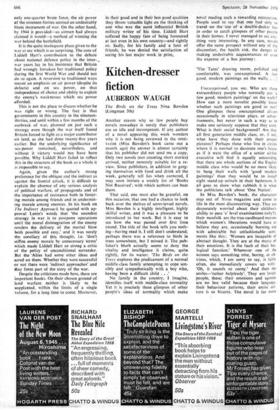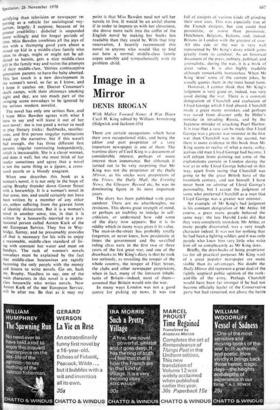Kitchen-dresser fiction
AUBERON WAUGH
The Birds on the Trees Nina Bawden (Longman 30s) Another reason why so few people buy novels nowadays is surely that publishers are so idle and incompetent. If any author of a novel appearing this week wonders why it is not being reviewed in the SPEC- TATOR (Miss Bawden's book came out a month ago) the answer is almost certainly that his publisher did not send me a copy. Only two novels (not counting short stories) arrived, neither remotely suitable for a re- view. Since publishers, in addition to gorg- ing themselves with food and drink all the week, generally tell lies when cornered, I may soon initiate a weekly list of 'Books Not Received', with which authors can beat them.
That said, one must also be grateful, on this occasion, that one had a chance to look back over the shelves of unreviewed novels. Miss Bawden is a highly intelligent, highly skilful writer, and it was a pleasure to be introduced to her work. But it is easy to see how she was passed over first time round. The title of the book tells you noth- ing—having read it, I still don't understand; perhaps there was a reference to birds in trees somewhere, but I missed it. The pub, fisher's blurb actually seems to deny the vitality and intelligence it claims, quite rightly, for its wares: The Birds on the Trees explores the predicament of a normal middle-class family attempting to cope sen- sibly and sympathetically with a boy who, having been a difficult child . .
No family in the country, I imagine, identifies itself with middle-class normality Yet it is precisely these glimpses of other people's ideas of normality which make
novel reading such a rewarding occupation. People used to say that one had only to travel on the top of a double-decker bus in order to catch glimpses of other people in their homes. I never managed to see any- thing very interesting. In any case, novels offer the same prospect without any of the discomfort, the health risk, the danger of making undesirable acquaintances or even the expense of a bus journey: The Tates' drawing room, polished and comfortable, was unexceptional. A few good, modern paintings on the walls; ..
Unexceptional, you see. Who are these extraordinary people who normally put 'a few good, modern paintings' on the walls? How can a mere novelist possibly know whether such paintings are good or not? One glimpses these unexceptional decors occasionally in television plays, or adver- tisements, but never in such a way as to make one seriously suppose that they exist. What is their social background? Are they all first generation middle class, or, if not, what have they done with their proper pictures? Perhaps those who live in circles where it is normal to decorate one's house as if it were the office of a senior airline executive will find- it equally astounding that there are whole sections of the English middle class who would be no more likely to hang their walls with 'good modern paintings' than they would be to install eight stand-up urinals in their bathroom. It all goes to show what rubbish it is when the politicians talk about 'One Nation'.
In Miss Bawden's book, the characters step out of Nova magazine and come to life in the most disconcerting way. They are desperately worried about their children's ability to pass 'A' level examinations (why?); their menfolk are the true cardboard morons which women's liberations would have us believe they are, occasionally bursting out with admirable but unfashionable senti- ments like this: 'Women are incapable of abstract thought. They are at the mercy of their emotions. -It is the fault of their bio- logical function.' Whenever one of the women says something trite, boring, or ob- vious, which, I am sorry to say, is fairly often, she immediately covers up with: 'Oh, it sounds so corny.' And then she smiles—`rather helplessly'. They are lovely people, these; their emotions and agonies are no less valid because their language, their behaviour patterns, their entire cul- ture is so bizarre. The novel is far more satisfying than television or newspaper re- porting as a vehicle for sociological voy- eurism, largely, I suppose, because of its greater credibility: disbelief is suspended more willingly and for longer periods of time. Miss Bawden combines all the joys of this with a thumping good yarn about a mixed up kid in a middle-class family who takes to drugs, might or might not be ad- dicted to heroin, gets a nice middle-class girl in the family way and resists the attempts of their middle-class, 'thirties contraceptive generation parents to have the baby aborted. This last touch is a new development in the woman's novel, so far as I know, and I hope it catches on. Doctor Crossman's death camps, with their chimneys smoking night and day, are too much part of the swinging scene nowadays to be ignored by the serious modern novelist.
The novel has only one serious flaw, and I hope Miss Bawden agrees with what I have to say and will leave it out of her next novel: she is too good a writer to need to play literary tricks: flashbacks, recollec- tions, and first person singular ruminations break up the narrative, but if this wasn't bad enough, she has three different first persons singular ruminating independently, which is inexcusable. She is a clever woman, and does it well, but she must think of her reader sometimes and agree that a novel is not the same thing as a jigsaw, a cross- word puzzle or a bloody anagram.
When one describes this book as a woman's novel, it is not only in the hope of seeing Brophy thunder down Gower Street with a horsewhip. It is a woman's novel in that sense, too, and could certainly not have been written by a member of any other sex,-unless suffering from the gravest form of identity dislocation. But it is a woman's novel in another sense, too, in that it is written by a housewife married to a pro- fessional person called Austen Kark of the BBC European Service. They live in Wey- bridge, Surrey, and he presumably provides all that is necessary for his wife to enjoy a reasonable, middle-class standard of liv- ing with constant hot water and meat on Sundays. The rash of women's novels nowadays must be explained by the fact that middle-class housewives are rapidly becoming the only people with the money and leisure to write novels. Go on, bash me, Brophy. Needless to say, one of the main characters in this novel is a middle- class housewife who writes novels. Now Austen Kark of the BBC European Service, will be after me. Be that as it may my
point is that Miss Bawden need not sell her novels to live. It would be an awful shame if in order to impress us with her cleverness, she drove more nails into the coffin of the English novel by making her books less readable than they could be. With that tiny reservation, I heartily recommend this novel to anyone who would like to find out how a normal middle-class family copes sensibly and sympathetically with its problem child.















































 Previous page
Previous page